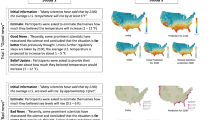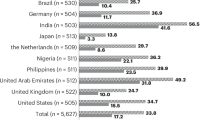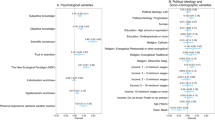Abstract
Climate beliefs shape engagement with climate action, yet research often overlooks their interconnections. This research frames climate beliefs as a belief system and examines two structural features: density (the strength of all connections) and inconsistency (conflicts between beliefs). Using Facebook survey data from 110 geographic areas (n = 99,074), we show that global north presents higher density networks, where climate beliefs are more tightly correlated, while many global south areas have positive but less interconnected beliefs. Inconsistency appears in geographic areas where opposition to reducing fossil fuel use conflicts with support for renewable energy and government prioritization of climate policies, such as in the Middle East. Information exposure is positively correlated with density and negatively with inconsistency. Gross domestic product per capita is positively associated with density and carbon resource dependence positively correlates with inconsistency. These findings offer communication strategies to enhance climate belief endurance while addressing conflicting beliefs that may undermine climate action.
This is a preview of subscription content, access via your institution
Access options
Access Nature and 54 other Nature Portfolio journals
Get Nature+, our best-value online-access subscription
$32.99 / 30 days
cancel any time
Subscribe to this journal
Receive 12 print issues and online access
$259.00 per year
only $21.58 per issue
Buy this article
- Purchase on SpringerLink
- Instant access to full article PDF
Prices may be subject to local taxes which are calculated during checkout




Similar content being viewed by others
Data availability
Data aggregated at the area level can be accessed on our Open Science Framework (OSF) project page at https://doi.org/10.17605/OSF.IO/ASY54 (ref. 49). The complete dataset is proprietary and available upon submitting a request form via https://dataforgood.facebook.com/dfg/tools/climate-change-opinion-survey#accessdata.
Code availability
All code used to analyse data and create figures for this article is available on our OSF project page at https://doi.org/10.17605/OSF.IO/ASY54 (ref. 49).
References
Paris Agreement (UNFCCC, 2016); https://unfccc.int/process-and-meetings/the-paris-agreement/the-paris-agreement
Converse, P. E. The nature of belief systems in mass publics (1964). Crit. Rev. 18, 1–74 (2006).
Dalege, J., Borsboom, D., Van Harreveld, F. & Van Der Maas, H. L. J. A network perspective on attitude strength: testing the connectivity hypothesis. Soc. Psychol. Personal. Sci. 10, 746–756 (2019).
Brandt, M. J. & Sleegers, W. W. A. Evaluating belief system networks as a theory of political belief system dynamics. Personal. Soc. Psychol. Rev. 25, 159–185 (2021).
Dalege, J. & van der Does, T. Using a cognitive network model of moral and social beliefs to explain belief change. Sci. Adv. 8, eabm0137 (2022).
Brandt, M. J., Sibley, C. G. & Osborne, D. What is central to political belief system networks? Pers. Soc. Psychol. Bull. 45, 1352–1364 (2019).
Lee, S. et al. Climate change belief systems across political groups in the United States. PLoS ONE 19, e0300048 (2024).
Fishman, N. & Davis, N. T. Change we can believe in: structural and content dynamics within belief networks. Am. J. Polit. Sci. 66, 648–663 (2022).
Brandt, M. J. & Morgan, G. S. Between-person methods provide limited insight about within-person belief systems. J. Personal. Soc. Psychol. 123, 621–635 (2022).
Alvarez, R. M. & Brehm, J. American ambivalence towards abortion policy: development of a heteroskedastic probit model of competing values. Am. J. Polit. Sci. 39, 1055–1082 (1995).
Detenber, B. H., Ho, S. S., Ong, A. H. & Lim, N. W. Complementary versus competitive framing effects in the context of pro-environmental attitudes and behaviors. Sci. Commun. 40, 173–198 (2018).
Boutyline, A. & Vaisey, S. Belief network analysis: a relational approach to understanding the structure of attitudes. Am. J. Sociol. 122, 1371–1447 (2017).
Turner-Zwinkels, F. M. et al. Affective polarization and political belief systems: the role of political identity and the content and structure of political beliefs. Pers. Soc. Psychol. Bull. 51, 222–238 (2025).
Lind, A. V., Morton, T. A. & Dalege, J. Comparing attitudinal structures between political orientations: a network analysis of climate change attitudes. J. Environ. Psychol. 97, 102370 (2024).
Verschoor, M., Albers, C., Poortinga, W., Böhm, G. & Steg, L. Exploring relationships between climate change beliefs and energy preferences: a network analysis of the European Social Survey. J. Environ. Psychol. 70, 101435 (2020).
Pelham, B. Awareness, opinions about global warming vary worldwide. Gallup.com https://news.gallup.com/poll/117772/awareness-opinions-global-warming-vary-worldwide.aspx (2009).
Pugliese, A. & Ray, J. Fewer Americans, Europeans view global warming as a threat. Gallup.com https://news.gallup.com/poll/147203/Fewer-Americans-Europeans-View-Global-Warming-Threat.aspx (2011).
Rzepa, A. & Ray, J. Gallup world risk poll reveals global threat from climate change. Gallup.com https://news.gallup.com/opinion/gallup/321635/world-risk-poll-reveals-global-threat-climate-change.aspx (2020).
Lee, T. M., Markowitz, E. M., Howe, P. D., Ko, C.-Y. & Leiserowitz, A. A. Predictors of public climate change awareness and risk perception around the world. Nat. Clim. Change 5, 1014–1020 (2015).
Leiserowitz, A. et al. International Public Opinion on Climate Change, 2023 (Yale Program on Climate Change Communication, 2023).
Flynn, C. et al. Peoples’ Climate Vote 2024 (UNDP, 2024).
Rohrschneider, R. Environmental belief systems in Western Europe: a hierarchical model of constraint. Comp. Polit. Stud. 26, 3–29 (1993).
Keskintürk, T. The organization of political belief networks: a cross-country analysis. Soc. Sci. Res. 107, 102742 (2022).
Maran, D. A. & Begotti, T. Media exposure to climate change, anxiety, and efficacy beliefs in a sample of Italian university students. IJERPH 18, 9358 (2021).
Knight, K. W. Does fossil fuel dependence influence public awareness and perception of climate change? A cross-national investigation. Int. J. Sociol. 48, 295–313 (2018).
Lo, A. Y. & Chow, A. T. The relationship between climate change concern and national wealth. Clim. Change 131, 335–348 (2015).
Czarnek, G., Kossowska, M. & Szwed, P. Right-wing ideology reduces the effects of education on climate change beliefs in more developed countries. Nat. Clim. Change 11, 9–13 (2021).
Levi, S. Country-level conditions like prosperity, democracy, and regulatory culture predict individual climate change belief. Commun. Earth Environ. 2, 51 (2021).
Hornsey, M. J., Harris, E. A., Bain, P. G. & Fielding, K. S. Meta-analyses of the determinants and outcomes of belief in climate change. Nat. Clim. Change 6, 622–626 (2016).
Eveland, W. P. The cognitive mediation model of learning from the news: evidence from nonelection, off-year election, and presidential election contexts. Commun. Res. 28, 571–601 (2001).
Knight, K. W. Public awareness and perception of climate change: a quantitative cross-national study. Environ. Sociol. 2, 101–113 (2016).
Tranter, B. & Booth, K. Scepticism in a changing climate: a cross-national study. Glob. Environ. Change 33, 154–164 (2015).
Roser-Renouf, C., Stenhouse, N., Rolfe-Redding, J., Maibach, E. W. & Leiserowitz, A. in The Routledge Handbook of Environment and Communication (eds Hansen, A. & Cox, R.) 388–406 (Routledge, 2015).
Leiserowitz, A. et al. International Public Opinion on Climate Change, 2022 (Yale Program on Climate Change Communication, 2022).
Leiserowitz, A. et al. Climate Change in the American Mind: Beliefs & Attitudes, Fall 2023 (Yale Program on Climate Change Communication, 2023).
Epskamp, S. & Fried, E. I. A tutorial on regularized partial correlation networks. Psychol. Methods 23, 617–634 (2018).
UNCTAD Handbook of Statistics 2023 (UN, 2023).
Dalege, J., Borsboom, D., van Harreveld, F. & van der Maas, H. L. J. The attitudinal entropy (AE) framework as a general theory of individual attitudes. Psychol. Inq. 29, 175–193 (2018).
Hase, V., Mahl, D., Schäfer, M. S. & Keller, T. R. Climate change in news media across the globe: an automated analysis of issue attention and themes in climate change coverage in 10 countries (2006–2018). Glob. Environ. Change 70, 102353 (2021).
Boykoff, M. T. Flogging a dead norm? Newspaper coverage of anthropogenic climate change in the United States and United Kingdom from 2003 to 2006. Area 39, 470–481 (2007).
Stecula, D. A. & Merkley, E. Framing climate change: economics, ideology, and uncertainty in American news media content from 1988 to 2014. Front. Commun. 4, 6 (2019).
Hargittai, E. Potential biases in big data: omitted voices on social media. Soc. Sci. Comput. Rev. 38, 10–24 (2020).
Wyche, S. P., Schoenebeck, S. Y. & Forte, A. ‘Facebook is a luxury’: an exploratory study of social media use in rural Kenya. In Proc. 2013 Conference on Computer Supported Cooperative Work 33–44 (ACM, 2013).
Epskamp, S., Borsboom, D. & Fried, E. I. Estimating psychological networks and their accuracy: a tutorial paper. Behav. Res. 50, 195–212 (2018).
GDP Per Capita, PPP (Current International $) (World Bank, 2021); https://data.worldbank.org/indicator/NY.GDP.PCAP.PP.CD
Natural Gas Rents (% of GDP) (World Bank, 2022); https://data.worldbank.org/indicator/NY.GDP.NGAS.RT.ZS
Oil Rents (% of GDP) (World Bank, 2022); https://data.worldbank.org/indicator/NY.GDP.PETR.RT.ZS
Coal Rents (% of GDP) (World Bank, 2022); https://data.worldbank.org/indicator/NY.GDP.COAL.RT.ZS
Lee, S. et al. Variations in climate change belief systems across 110 geographic areas. OSF https://doi.org/10.17605/OSF.IO/ASY54 (2025).
Acknowledgements
A.L. discloses support for the research of this work from the MacArthur Foundation (grant number 21-2108-155887-CLS), the Schmidt Family Foundation (grant number G-23-66041) and a gift from King Philanthropies.
Author information
Authors and Affiliations
Contributions
S.L. and M.H.G. conceived the study idea. S.L. conducted the data analysis. M.V. assisted in curating external data sources. A.L. secured funding for the project. S.L., H.T.V., J.T., M.V., M.H.G., J.C., S.A.R. and A.L. contributed to writing the paper.
Corresponding author
Ethics declarations
Competing interests
The authors declare no competing interests.
Peer review
Peer review information
Nature Climate Change thanks Jianxun Yang and the other, anonymous, reviewers for their contribution to the peer review of this work.
Additional information
Publisher’s note Springer Nature remains neutral with regard to jurisdictional claims in published maps and institutional affiliations.
Extended data
Supplementary information
Supplementary Information
Supplementary Sections 1–4, Table 1–8 and Figs. 1–18.
Rights and permissions
Springer Nature or its licensor (e.g. a society or other partner) holds exclusive rights to this article under a publishing agreement with the author(s) or other rightsholder(s); author self-archiving of the accepted manuscript version of this article is solely governed by the terms of such publishing agreement and applicable law.
About this article
Cite this article
Lee, S., Vu, H.T., Thaker, J. et al. Variations in climate change belief systems across 110 geographic areas. Nat. Clim. Chang. 15, 947–953 (2025). https://doi.org/10.1038/s41558-025-02410-1
Received:
Accepted:
Published:
Issue date:
DOI: https://doi.org/10.1038/s41558-025-02410-1



